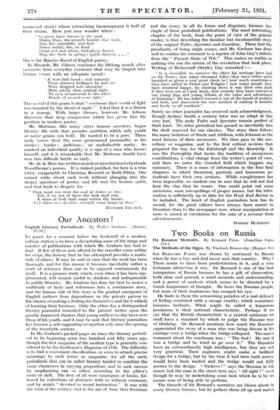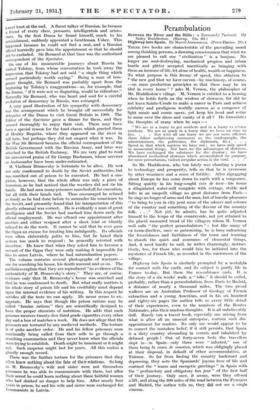Two Books on Russia
The Methods of the Ogpu. By Vladimir Brunovsky. (Harper. DEO SIR BERNARD PARES was drawn by sentiment to Russia when he was a boy and had never seen that country. Why ? There seems to have been predestination in it, and a very fortunate attraction it was. Sir Bernard is one of the best interpreters of Russia because he has a gift of observation, both close and general, a mind accurate and understanding, and a power of analysis which seems to be directed by a Greek temperance of thought. He loves the Russian people, but none of their weaknesses has escaped his eye.
He finds in them the astonishing paradox of a real delicacy of feeling combined with a savage crudity, which sometimes becomes barbaric. What might be called a humorous pessimism is their national characteristic. Perhaps if we say that the British characteristic is a cynical optimism we shall have a standard by which to judge the Russian way of thinking. Sir Bernard mentions how much the Russians appreciated the story of a man who was being driven in his carriage over a bridge when the bridge collapsed. The man's comment about the coachman was : " The fool ! He saw it
was a bridge and he tried to go over The Russians have an extraordinarily high intelligence, but they are not very practical. Their engineers might make a brilliant design for a bridge, but by the time it had been built money would have been wasted and the bridge would not fully answer to the design. " Nichevo ! " says the Russian in the street, but the man in the street here says " All right ! " even though he may be undertaking some task which he is by no means sure of being able to perform.
The threads. of Sir Bernard's narrative are blown about in many literary breezes, but he gathers them all up and makes
a neat knot at the end. A fluent talker of Russian, he became a friend of every class, peasants, intelligentsia and aristo- crats. In the first Duma he found himself, much to his astonishment, suddenly appointed a Gentleman Usher. This happened because he could not find a seat, and a Russian official hurriedly gave him the appointment so that he should not be excluded. Sir Bernard at that time was the authorized correspondent of the Spectator.
On one of his innumerable journeys about Russia he visited Tolstoy, from whose conversation he took away the impression that Tolstoy had not said " a single thing which seemed particularly worth saying." Being a man of tem- perate thought, Sir Bernard was probably upset from the beginning by Tolstoy's exaggerations—as, for example, that the Duma, " if it were not so disgusting, would be ridiculous." Naturally Sir Bernard, who was heart and soul for a careful evolution of democracy in Russia, was estranged.
A very good illustration of his sympathy with democracy was the arrangement which he brought off successfully for delegates of the Duma to visit Great Britain in 1909. The Editor of the Spectator gave a dinner for them, and they seemed thoroughly to enjoy their visit. There may have been a special reason for the loud cheers which greeted them at Henley Regatta, where they appeared on the river in tall hats, but perhaps they did not suspect what it was. In the War Sir Bernard became the official correspondent of the British Government with the Russian Army, and later was attached to the British Embassy. We are very glad to read his unreserved praise of Sir George Buchanan, whose services as Ambassador have been under-estimated..
M. Vladimir Brunovsky is fortunate to be alive. He was not only condemned to death by the Soviet authorities, but was marched out of. prison to be executed. He had a sus- picion, however, that the whole affair was only a piece of terrorism, as he had noticed that the warders did not tie his hands. He had seen many prisoners marched off for execution, but all with their hands tied. Thus encouraged he refused as firmly as he had done before to surrender his conscience to the Soviet, and presently found that his interpretation of this ghastly rehearsal was correct. He is evidently a man of great intelligence and the Soviet had marked him down early for official employment. He was offered one appointment after another, and either resigned after a short trial or bluntly refused to do the work. It cannot be said that he ever gave the Ogpu an excuse for treating him indulgently. Its officials were often elaborately polite to him, but he hated their system too much to respond ; he generally retorted with invective. He knew that when they asked him to become a servant of the Ogpu they were only making it impossible for him to enter Latvia, where he had naturalization papers.
The volume contains several photographs of warrants— one for searching his house, his death warrant and so on. The publishers explain that they are reproduced "as evidence of the authenticity of M. Brunovsky's story." They are, of course, evidence only that M. Brunovsky's house was searched and that he was condemned to death. But what really matters is his whole story of prison life and his credibility must depend upon the internal evidence of his writing. In this respect he satisfies all the tests we can apply. He never seems to ex- aggerate. He says that though the prison rations may be called "famine rations" they are scientifically designed to have the proper elements of nutrition. He adds that each prisoner receives twenty-five third grade cigarettes every other day and a box of matches a week. He does not allege that the prisoners are tortured by any medieval methods. The torture is of quite another order. He and his fellow prisoners were continually being called from their cells to go through a searching examination and they never knew what the officials were trying to establish. Death might be imminent or it might not. Such suspense might last for years. All this makes a ghastly enough record.
There was the further torture for the prisoners that they often knew nothing about the fate of their relations. So long as M. Brunovsky's wife and sister were not themselves prisoners he was able to communicate with them, but after their arrest he could learn nothing about these faithful women who had shirked no danger to help him. After nearly four years in prison, he and his -wife and sister were exchanged for Communists in Latvia.












































 Previous page
Previous page